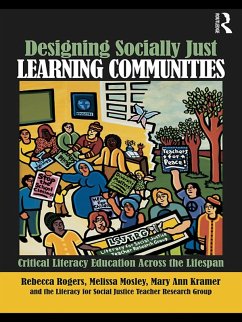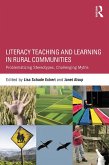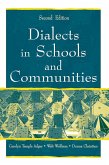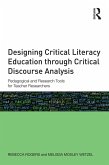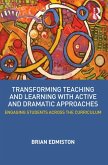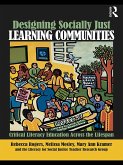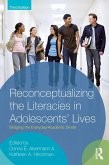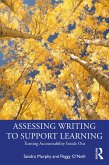Rebecca Rogers, Mary Ann Kramer, Melissa Mosley, The Literacy for Social Justice Teacher Research Group
Designing Socially Just Learning Communities (eBook, ePUB)
Critical Literacy Education across the Lifespan
45,95 €
45,95 €
inkl. MwSt.
Sofort per Download lieferbar

23 °P sammeln
45,95 €
Als Download kaufen

45,95 €
inkl. MwSt.
Sofort per Download lieferbar

23 °P sammeln
Jetzt verschenken
Alle Infos zum eBook verschenken
45,95 €
inkl. MwSt.
Sofort per Download lieferbar
Alle Infos zum eBook verschenken

23 °P sammeln
Rebecca Rogers, Mary Ann Kramer, Melissa Mosley, The Literacy for Social Justice Teacher Research Group
Designing Socially Just Learning Communities (eBook, ePUB)
Critical Literacy Education across the Lifespan
- Format: ePub
- Merkliste
- Auf die Merkliste
- Bewerten Bewerten
- Teilen
- Produkt teilen
- Produkterinnerung
- Produkterinnerung

Bitte loggen Sie sich zunächst in Ihr Kundenkonto ein oder registrieren Sie sich bei
bücher.de, um das eBook-Abo tolino select nutzen zu können.
Hier können Sie sich einloggen
Hier können Sie sich einloggen
Sie sind bereits eingeloggt. Klicken Sie auf 2. tolino select Abo, um fortzufahren.

Bitte loggen Sie sich zunächst in Ihr Kundenkonto ein oder registrieren Sie sich bei bücher.de, um das eBook-Abo tolino select nutzen zu können.
Designing Socially Just Learning Communities models an innovative form of professional development for educators and researchers who are seeking ways to transform educational practices. The teachers' practices and actions - in their classrooms and as members of the teacher research group - will speak loudly to policy-makers, researchers, and activists who wish to work alongside them.
- Geräte: eReader
- mit Kopierschutz
- eBook Hilfe
- Größe: 2.85MB
Andere Kunden interessierten sich auch für
![Literacy Teaching and Learning in Rural Communities (eBook, ePUB) Literacy Teaching and Learning in Rural Communities (eBook, ePUB)]() Literacy Teaching and Learning in Rural Communities (eBook, ePUB)51,95 €
Literacy Teaching and Learning in Rural Communities (eBook, ePUB)51,95 €![Dialects in Schools and Communities (eBook, ePUB) Dialects in Schools and Communities (eBook, ePUB)]() Carolyn Temple AdgerDialects in Schools and Communities (eBook, ePUB)45,95 €
Carolyn Temple AdgerDialects in Schools and Communities (eBook, ePUB)45,95 €![Designing Critical Literacy Education through Critical Discourse Analysis (eBook, ePUB) Designing Critical Literacy Education through Critical Discourse Analysis (eBook, ePUB)]() Rebecca RogersDesigning Critical Literacy Education through Critical Discourse Analysis (eBook, ePUB)45,95 €
Rebecca RogersDesigning Critical Literacy Education through Critical Discourse Analysis (eBook, ePUB)45,95 €![Transforming Teaching and Learning with Active and Dramatic Approaches (eBook, ePUB) Transforming Teaching and Learning with Active and Dramatic Approaches (eBook, ePUB)]() Brian EdmistonTransforming Teaching and Learning with Active and Dramatic Approaches (eBook, ePUB)51,95 €
Brian EdmistonTransforming Teaching and Learning with Active and Dramatic Approaches (eBook, ePUB)51,95 €![Designing Socially Just Learning Communities (eBook, PDF) Designing Socially Just Learning Communities (eBook, PDF)]() Rebecca RogersDesigning Socially Just Learning Communities (eBook, PDF)45,95 €
Rebecca RogersDesigning Socially Just Learning Communities (eBook, PDF)45,95 €![Reconceptualizing the Literacies in Adolescents' Lives (eBook, ePUB) Reconceptualizing the Literacies in Adolescents' Lives (eBook, ePUB)]() Reconceptualizing the Literacies in Adolescents' Lives (eBook, ePUB)75,95 €
Reconceptualizing the Literacies in Adolescents' Lives (eBook, ePUB)75,95 €![Assessing Writing to Support Learning (eBook, ePUB) Assessing Writing to Support Learning (eBook, ePUB)]() Sandra MurphyAssessing Writing to Support Learning (eBook, ePUB)38,95 €
Sandra MurphyAssessing Writing to Support Learning (eBook, ePUB)38,95 €-
-
-
Designing Socially Just Learning Communities models an innovative form of professional development for educators and researchers who are seeking ways to transform educational practices. The teachers' practices and actions - in their classrooms and as members of the teacher research group - will speak loudly to policy-makers, researchers, and activists who wish to work alongside them.
Dieser Download kann aus rechtlichen Gründen nur mit Rechnungsadresse in A, B, BG, CY, CZ, D, DK, EW, E, FIN, F, GR, HR, H, IRL, I, LT, L, LR, M, NL, PL, P, R, S, SLO, SK ausgeliefert werden.
Produktdetails
- Produktdetails
- Verlag: Taylor & Francis eBooks
- Seitenzahl: 248
- Erscheinungstermin: 7. Mai 2009
- Englisch
- ISBN-13: 9781135840921
- Artikelnr.: 38258684
- Verlag: Taylor & Francis eBooks
- Seitenzahl: 248
- Erscheinungstermin: 7. Mai 2009
- Englisch
- ISBN-13: 9781135840921
- Artikelnr.: 38258684
- Herstellerkennzeichnung Die Herstellerinformationen sind derzeit nicht verfügbar.
Rebecca Rogers is Associate Professor of Literacy at the University of Missouri-St. Louis. Her research focuses on language, identity, and power in and out of school contexts.
Melissa Mosley is Assistant Professor of Language and Literacy at the University of Texas at Austin. Her research focuses on critical literacy learning across the lifespan, particularly how teachers and students together use literacy practices toward social action in and out of the classroom.
Mary Ann Kramer is Coordinator for Adult Education and Literacy in the St.
Louis Public Schools. Prior to this position, she served as Director of the Southside
Women's Center, a community-based women's resource center.
The Literacy for Social Justice Teacher Research Group is a grassroots, teacher-led professional development group dedicated to exploring and acting on the relationships between literacy and social justice.
Melissa Mosley is Assistant Professor of Language and Literacy at the University of Texas at Austin. Her research focuses on critical literacy learning across the lifespan, particularly how teachers and students together use literacy practices toward social action in and out of the classroom.
Mary Ann Kramer is Coordinator for Adult Education and Literacy in the St.
Louis Public Schools. Prior to this position, she served as Director of the Southside
Women's Center, a community-based women's resource center.
The Literacy for Social Justice Teacher Research Group is a grassroots, teacher-led professional development group dedicated to exploring and acting on the relationships between literacy and social justice.
Part 1. Beginnings
1: Introduction
2: A Framework for Critical Literacy Education Across the Lifespan: A Case
Study of the Literacy for Social Justice Teacher Research Group
Part II. An Entry Point: Developing Critical Stances
3: Talking about War in a Second Grade Classroom, Melissa Mosley
4: Writing our Way to Cultural Understandings, Rebecca Light
5: Learning to Listen: Creating Socially Just Curricula for Middle and High
School Classrooms, Sarah Hobson
6: "No Disrespect": Literature Discussion as Social Action, Carolyn Fuller
7: Response Chapter- Developing Critical Stances and Multiple Perspectives,
Bridgette Jenkins, Mary Ann Kramer, Meredith Labadie, Melissa Mosley,
Kathryn Pole and Ben Yavitz
Part III. An Entry Point: Critical Inquiry and Analysis
8: Shared Leadership, Adolescent Literacies, and Social Justice Education
in the "Third Space", Melissa Mosley and Margaret Finders
9: Designing a Critical Literacy Lab in an Adult Education Center, Mary Ann
Kramer and Rhonda Jones
10: The Center for Human Origin and Cultural Diversity: A Catalyst for
Social Justice and Racial Literacy, Jacquelyn A. Lewis-Harris
11: Response Chapter- Critical Inquiry and Analysis: Making Space for
Critical Literacy, Carolyn Brown, Ora Clark-Lewis, Aleshea Ingram, Mary Ann
Kramer, and Melissa Mosley
Part IV. An Entry Point: Building Community
12: New Teachers Developing as Educators/Activists, Liesl Buechler and Kate
Lofton
13: Working Within and Against Heterosexist and Homophobic Schools: Social
Justice and High School Journalism, Janet DePasquale
14: Following the Circles: Organizing for Justice through Literacy
Education, Sarah Beaman-Jones
15: Response Chapter- Building Relationships of Struggle and Solidarity,
Angela Folkes, Cristina Mann, Melissa Mosley, Rebecca Rogers and Alina
Slapac
Part V. What Is and What Might Be
16: Designing Socially Just Learning Communities Across the Lifespan: What
Is and What Might Be
Appendix I: Declaration Statement
Appendix II: Frameworks of Critical Literacy Lab: Engaged Instruction, St.
Louis Public Schools Adult Education and Literacy
Notes on Contributors
Films and Children's Books
References
Index
1: Introduction
2: A Framework for Critical Literacy Education Across the Lifespan: A Case
Study of the Literacy for Social Justice Teacher Research Group
Part II. An Entry Point: Developing Critical Stances
3: Talking about War in a Second Grade Classroom, Melissa Mosley
4: Writing our Way to Cultural Understandings, Rebecca Light
5: Learning to Listen: Creating Socially Just Curricula for Middle and High
School Classrooms, Sarah Hobson
6: "No Disrespect": Literature Discussion as Social Action, Carolyn Fuller
7: Response Chapter- Developing Critical Stances and Multiple Perspectives,
Bridgette Jenkins, Mary Ann Kramer, Meredith Labadie, Melissa Mosley,
Kathryn Pole and Ben Yavitz
Part III. An Entry Point: Critical Inquiry and Analysis
8: Shared Leadership, Adolescent Literacies, and Social Justice Education
in the "Third Space", Melissa Mosley and Margaret Finders
9: Designing a Critical Literacy Lab in an Adult Education Center, Mary Ann
Kramer and Rhonda Jones
10: The Center for Human Origin and Cultural Diversity: A Catalyst for
Social Justice and Racial Literacy, Jacquelyn A. Lewis-Harris
11: Response Chapter- Critical Inquiry and Analysis: Making Space for
Critical Literacy, Carolyn Brown, Ora Clark-Lewis, Aleshea Ingram, Mary Ann
Kramer, and Melissa Mosley
Part IV. An Entry Point: Building Community
12: New Teachers Developing as Educators/Activists, Liesl Buechler and Kate
Lofton
13: Working Within and Against Heterosexist and Homophobic Schools: Social
Justice and High School Journalism, Janet DePasquale
14: Following the Circles: Organizing for Justice through Literacy
Education, Sarah Beaman-Jones
15: Response Chapter- Building Relationships of Struggle and Solidarity,
Angela Folkes, Cristina Mann, Melissa Mosley, Rebecca Rogers and Alina
Slapac
Part V. What Is and What Might Be
16: Designing Socially Just Learning Communities Across the Lifespan: What
Is and What Might Be
Appendix I: Declaration Statement
Appendix II: Frameworks of Critical Literacy Lab: Engaged Instruction, St.
Louis Public Schools Adult Education and Literacy
Notes on Contributors
Films and Children's Books
References
Index
Part 1. Beginnings
1: Introduction
2: A Framework for Critical Literacy Education Across the Lifespan: A Case
Study of the Literacy for Social Justice Teacher Research Group
Part II. An Entry Point: Developing Critical Stances
3: Talking about War in a Second Grade Classroom, Melissa Mosley
4: Writing our Way to Cultural Understandings, Rebecca Light
5: Learning to Listen: Creating Socially Just Curricula for Middle and High
School Classrooms, Sarah Hobson
6: "No Disrespect": Literature Discussion as Social Action, Carolyn Fuller
7: Response Chapter- Developing Critical Stances and Multiple Perspectives,
Bridgette Jenkins, Mary Ann Kramer, Meredith Labadie, Melissa Mosley,
Kathryn Pole and Ben Yavitz
Part III. An Entry Point: Critical Inquiry and Analysis
8: Shared Leadership, Adolescent Literacies, and Social Justice Education
in the "Third Space", Melissa Mosley and Margaret Finders
9: Designing a Critical Literacy Lab in an Adult Education Center, Mary Ann
Kramer and Rhonda Jones
10: The Center for Human Origin and Cultural Diversity: A Catalyst for
Social Justice and Racial Literacy, Jacquelyn A. Lewis-Harris
11: Response Chapter- Critical Inquiry and Analysis: Making Space for
Critical Literacy, Carolyn Brown, Ora Clark-Lewis, Aleshea Ingram, Mary Ann
Kramer, and Melissa Mosley
Part IV. An Entry Point: Building Community
12: New Teachers Developing as Educators/Activists, Liesl Buechler and Kate
Lofton
13: Working Within and Against Heterosexist and Homophobic Schools: Social
Justice and High School Journalism, Janet DePasquale
14: Following the Circles: Organizing for Justice through Literacy
Education, Sarah Beaman-Jones
15: Response Chapter- Building Relationships of Struggle and Solidarity,
Angela Folkes, Cristina Mann, Melissa Mosley, Rebecca Rogers and Alina
Slapac
Part V. What Is and What Might Be
16: Designing Socially Just Learning Communities Across the Lifespan: What
Is and What Might Be
Appendix I: Declaration Statement
Appendix II: Frameworks of Critical Literacy Lab: Engaged Instruction, St.
Louis Public Schools Adult Education and Literacy
Notes on Contributors
Films and Children's Books
References
Index
1: Introduction
2: A Framework for Critical Literacy Education Across the Lifespan: A Case
Study of the Literacy for Social Justice Teacher Research Group
Part II. An Entry Point: Developing Critical Stances
3: Talking about War in a Second Grade Classroom, Melissa Mosley
4: Writing our Way to Cultural Understandings, Rebecca Light
5: Learning to Listen: Creating Socially Just Curricula for Middle and High
School Classrooms, Sarah Hobson
6: "No Disrespect": Literature Discussion as Social Action, Carolyn Fuller
7: Response Chapter- Developing Critical Stances and Multiple Perspectives,
Bridgette Jenkins, Mary Ann Kramer, Meredith Labadie, Melissa Mosley,
Kathryn Pole and Ben Yavitz
Part III. An Entry Point: Critical Inquiry and Analysis
8: Shared Leadership, Adolescent Literacies, and Social Justice Education
in the "Third Space", Melissa Mosley and Margaret Finders
9: Designing a Critical Literacy Lab in an Adult Education Center, Mary Ann
Kramer and Rhonda Jones
10: The Center for Human Origin and Cultural Diversity: A Catalyst for
Social Justice and Racial Literacy, Jacquelyn A. Lewis-Harris
11: Response Chapter- Critical Inquiry and Analysis: Making Space for
Critical Literacy, Carolyn Brown, Ora Clark-Lewis, Aleshea Ingram, Mary Ann
Kramer, and Melissa Mosley
Part IV. An Entry Point: Building Community
12: New Teachers Developing as Educators/Activists, Liesl Buechler and Kate
Lofton
13: Working Within and Against Heterosexist and Homophobic Schools: Social
Justice and High School Journalism, Janet DePasquale
14: Following the Circles: Organizing for Justice through Literacy
Education, Sarah Beaman-Jones
15: Response Chapter- Building Relationships of Struggle and Solidarity,
Angela Folkes, Cristina Mann, Melissa Mosley, Rebecca Rogers and Alina
Slapac
Part V. What Is and What Might Be
16: Designing Socially Just Learning Communities Across the Lifespan: What
Is and What Might Be
Appendix I: Declaration Statement
Appendix II: Frameworks of Critical Literacy Lab: Engaged Instruction, St.
Louis Public Schools Adult Education and Literacy
Notes on Contributors
Films and Children's Books
References
Index
